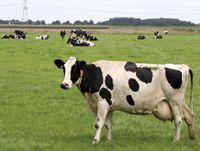A Moo Point

Kansas governor Kathleen Sebelius vetoed a bill last month that would have required a disclaimer statement placed on dairy products made without artificial growth hormones such as rBST.
Under the measure, producers that stated that their product does not come from cows supplemented with the artificial growth hormone rBST would have had to document the claim and place a disclaimer on the product label.
The disclaimer would have said: "The U.S. Food and Drug Administration has determined there are no significant differences between milk from cows that receive injections of the artificial hormone and milk from those that do not."
"Supporters of the bill claim it's necessary to protect consumers from false or misleading information. Yet there has been overwhelming opposition by consumer groups, small dairy producers, and retailers to this proposed legislation," said Sebelius.
Large dairy producers have argued that it is misleading for manufacturers to boast about their products being hormone-free. They say there is no evidence linking the artificial hormones given to cows with any troubles arising from milk or other dairy products.
However, supporters of the measure have said that the science is still up in the air and point to Europe and Canada where such hormones are banned. They say that some people want to know whether hormones are used because they believe that hormones could either adversely affect the quality of the milk or the health of the cow.
Some opponents to the bill have said they feared companies would have pulled their products from Kansas stores rather than have to comply with different labeling requirements.
"It just doesn't make sense for Kansas to go backwards," says Naomi Starkman of Consumers Union (Yonkers, NY), one of 29 groups that urged Sebelius to veto the bill.
Sebelius does support some aspects of the bill that she vetoed, including provisions dealing with pesticides, fertilizers, and dairy fees. When Sebelius leaves Kansas to become secretary of the U.S. Dept. of Health and Human Services, she will have oversight for the very agency that approved rBST.
"That makes this a national story," says Starkman.
The use of rBST hormones is banned throughout most other first-world nations. The labeling issue is moot in the 27-nation European Union, along with Canada, Japan, Australia, and New Zealand, because in those countries, synthetic hormones are prohibited for use in any consumer food product.
Senate Committee has released the text of 2024 Farm Bill, with changes to hemp regulations
November 19th 2024The U.S. Senate Committee on Agriculture, Nutrition, & Forestry has introduced the Rural Prosperity and Food Security Act, which will serve as the Senate’s draft for the 2024 Farm Bill.
NPA’s lawsuit against FDA on NMN stayed pending agency’s decision on citizen petition
November 6th 2024The court has granted a joint motion for stay filed by NPA and FDA, pending the agency's decision on the citizen petition asking FDA to reverse its stance on NMN's status as a dietary ingredient.